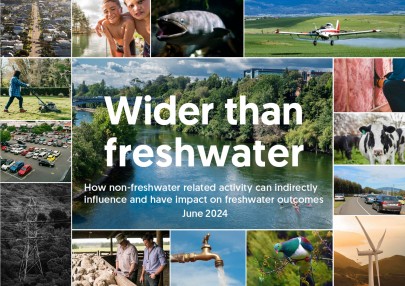It’s not easy being a policy-maker.
The world has more humans on it than it has ever had, we are hitting environmental limits and thresholds, systems are complex, and system changes have effects that are difficult to predict.
Questions such as how to allocate freshwater resources are phenomenally hard to think through. It’s very difficult to view the whole of a policy landscape, to zoom out far enough so that all the effects of proposed changes to freshwater management can be seen.
Equally it’s natural to want to simplify, to focus only on a part of the picture, but this can lead to policy that is siloed and conflicts with other policies. As a result, decision-makers can struggle to manage the competing demands of policy directives, and unintended consequences can arise.
Scientists at Manaaki Whenua - Landcare Research in collaboration with Deliberate have developed a new resource for policy makers – Wider than Freshwater – that takes a whole-systems-thinking approach to freshwater management in Aotearoa New Zealand.
The new resource allows policy makers to look at a particular aspect of the system, and to zoom out to see how it connects with freshwater management, highlighting how feedback loops intersect and interact across that system.
One of the most surprising aspects of this whole-of-system approach is how little is generally covered in standard freshwater policy discussions. Usually out of scope, for example, are considerations of power supply and energy infrastructure, transport, land-use change, housing stock, and climate change. Wider than Freshwater puts all these back into the picture, explaining via feedback loops how each is interconnected across the policy landscape.
Perspectives on possible areas of leverage or actions to take are also included: examples of low-level tweaks, medium-level rule changes and higher-level system goal-changes that policy makers could consider. The authors add that these are not explicit recommendations for policy responses but are aimed at improving policy alignment to achieve freshwater outcomes.


